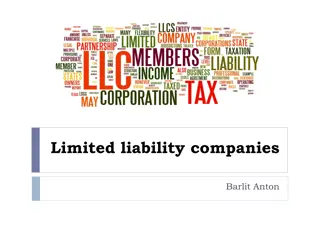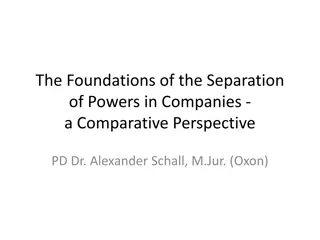An Overview of Different Types of Companies and Their Characteristics
Explore the various kinds of companies based on mode of incorporation, number of members, liability of members, and more. Learn about statutory companies, registered companies, private companies, and the distinctions between different types of companies in the business world.
Download Presentation

Please find below an Image/Link to download the presentation.
The content on the website is provided AS IS for your information and personal use only. It may not be sold, licensed, or shared on other websites without obtaining consent from the author.If you encounter any issues during the download, it is possible that the publisher has removed the file from their server.
You are allowed to download the files provided on this website for personal or commercial use, subject to the condition that they are used lawfully. All files are the property of their respective owners.
The content on the website is provided AS IS for your information and personal use only. It may not be sold, licensed, or shared on other websites without obtaining consent from the author.
E N D
Presentation Transcript
Chapter 2 Kinds of Companies
Kinds of Companies According to mode of incorporation Statutory Company Registered Company According to number of members Private Company Public Company One person Company According to liability of members Company limited by shares Company limited by guarantee Unlimited Company Other kinds of Companies Companies not for profit Foreign Company Government Company Holding Company and Subsidiary Company Associate Company Small Company Dormant Company Producer company
Miscellaneous Topics Difference between private and public companies Privileges available to private companies Conversion of Private companies into Public Companies and vice-versa Difference between private and producer companies
Statutory Company eg. LIC, RBI, UTI, FCI etc. Incorporated by a Special Act passed by Central or State legislature Such Companies carry on some business of national importance Exempted from having MOA or using 'limited' word in their name. Their audit supervision and guidance by CAG and Annual reports are to be placed before Central or State Legislature Governed by their Special Act but Companies Act is also applicable in so far as its provisions are not inconsistent with the provisions of Special Act
Registered Companies These are the companies which are registered under the Companies Act 2013 or earlier Companies Acts. Most of the companies are formed this way If some Insurance, Banking or Electricity Supply companies are incorporated under the Companies Act, then on operational matters they will be governed by their Special Acts and on other matters by the provisions of Companies Act. On the basis of no. of members, registered Companies can be # private,# public or #one person Company On the basis of liability of members, registered Companies can be# limited by shares, #limited by guarantee or #unlimited companies TPDDL i.e. Tata Power Delhi Distribution Lmt.- it an electricity supply company Bhatti Axa Life Insurance Company Lmt.-it is an insurance company. Both of them are registered companies and therefore end with word limited. But on operational matters they are governed by the Electricity Act, 2003 or the Insurance Act, 1938 respectively
Private Company ,Sec2(68) Restricts the right of members to transfer its shares Limits the number of members to 200 Prohibits any invitation to public to subscribe it's securities These companies must add "Private" word with its name. These companies enjoy certain exemptions and privileges
Public Company ,Sec.2(71) Shares are freely transferable Minimum membership required is 7 but maximum no limit Can invite public for subscription of its securities Subsidiary of a public company will be deemed to be public company (even when the subsidiary is a private company and has those three restricting clauses in its AOA) These companies are required to comply with lot of formalities and procedures
One Person Company, Sec.2(62) Has just one member who shall be a natural person but it is necessary to indicate name of another person (nominee)who shall become the member incase the only member dies or is incapacitated Necessary to mention the words 'One Person Company" in brackets below the company's name wherever printed/engraved/affixed Always incorporated as a private company. It may be limited by shares, or limited by guarantee or an unlimited company Such company enjoys certain additional exemptions like- no. of directors can range from 1 - 15, no need of their rotational retirement, no compulsion to conduct board meetings if there is just 1 director, no need to hold AGM/ EGM, the Financial Statements may not include cash flow statement and may be signed by just 1 director, BOD report is not too detailed, Annual Return can be abridged ; financial statements can be filed with ROC within 180 days of closure of financial year etc. This OPC status and concessions will be withdrawn if it's paid up share capital exceeds 50 lakhs or average annual turnover during preceding three consecutive financial years exceeds 2 crores. In such a case, the OPC is required to convert itself,within next 6 months, into a private or a public Co and take necessary steps such as - alteration of its AoA and MoA for making changes incidental to conversion, give notice to ROC(within a period of 60 days of conversion) informing it of cessation of its OPC status and conversion into private or public company as the case may be.
Companies limited by shares In such companies liability of members is limited by the memorandum to the amount remaining unpaid on shares held by them This liability can be enforced at any time during the existence of the company or during the winding up of company Most of the companies in India belong to this category Such companies are also known as limited liability companies If shares are fully paid, the liability of members will be nil
Companies Limited by guarantee In such companies, liability of members is limited by memorandum to the amount guaranteed by them (such amount as they have respectively undertaken to contribute to assets of the company to meet the deficiency at the time of its winding up) This liability/ guarantee can be enforced(demanded) only at the time of winding up and not before Non- trading companies formed for the promotion of art, science, commerce, sports, culture etc. are incorporated as guarantee companies. Eg. Chambers of Commerce, sports clubs, trade associations Memorandum of Association of such companies states what amount each member has guaranteed and this amount may differ from member to member Such companies may or may not have share capital. If it has share capital, liability of members will be two fold .i.e. they are liable for amount remaining unpaid on shares as well as amount payable under guarantee
Unlimited Companies Such companies have no limit on the liability of its members i.e. their liability may extend to their personal property to pay off the liabilities of the company Memorandum of such companies must state that liability of its members is unlimited Liability of members is enforceable only at the time of winding up Every member is liable to contribute in proportion of his interest in the company Such companies are very rare .Eg. Nova Scotia (Canada) Unlimited Liability Company, Cyber Ventures
Companies not for Profit/Licensed Companies (Sec.8) These companies are meant for promoting science,art,commerce,sports, religion, charity, social welfare, environmental protection or other useful objects. Eg.FICCI,CII,ASSOCHAM , National Sports Club of India etc. Before registration under Company's Act, they have to apply to the Central Govt. for a license which shall be granted on prescribed terms and conditions (this licence can be revoked by CG anytime this company contravenes any prescribed term\ condition) These companies are required to apply its income for promoting its objects and are not allowed to pay any dividends to its members.Even on winding up ,if any surplus assets are left after paying off all the debts and liabilities, those surplus assets will either be transferred to another Licensed company having similar objects or may be sold and proceeds shall be credited to Insolvency and Bankruptcy Fund. These companies have limited liability but are exempted from using words 'limited' or 'private 'limited' with their name These companies are subject to certain exemptions in form of tax benefits, procuring land and immovable at concessional rates, permission to receive donations etc. Further certain notified Sections of the Companies Act,2013 do not apply to such companies or apply but with some exceptions, modifications and adaptations.
Foreign Companies Foreign Company is a company incorporated outside India but which has a place of business in India (either by itself/agent/physically/electronically) and conducts any business activity in India in any manner. Such companies,if interested in raising funds from India , can issue IDRs i.e. Indian Depository Receipts after complying with rules made by CG in this regard. Obligations regarding filing of documents. Within 30 days of establishment of business in India, such companies have to furnish to the Registrar the Charter, Memorandum and Articles of the Company;address of the Registered office, particulars of directors and secretary; address of principal place of business in India, particulars of persons in India who will receive notices on behalf of the company etc. Obligation regarding Accounts - Every foreign company has to file every year with the Registrar ,the copy of its Balance Sheet,Profit and Loss Account and other documents as required under the Act . Obligation regarding Exhibition of the Name- A foreign company is required to exhibit its name and country of its Incorporation outside its every office in India (in English and regional language) and also on all its business letters,bills,advertisements, notices and its all other official publications (in English language) In case of contravention of any of the above provisions, foreign company shall be punishable with fine( ranging from 1 to 3 lakhs), additional fine( up to 50000 per day) in case of continuing default in addition to its punishment of imprisonment and\or fine of its officers in default. Further such defiant company is liable to be sued by others but it cannot file suit on others for counter claim or enforcement of its rights.
Government Company eg. Hindustan Machine Tools Ltd., State Trading Corporation of India Lmt. A Govt. Company is one in which not less that 51% paid up share capital is held singly or in combination by the Central Govt and/ or one or more State govts.A subsidiary of a Govt. Co. is regarded as a Govt . Co. It is to be registered under the Companies Act and could be incorporated as a 'public' or a 'private' company. These companies are governed by the Companies Act like any other limited company but may be granted by the Central govt exemptions from application of certain sections of the Companies Act or applications of such provisions with certain modifications/exceptions/adaptations Special provisions as regards audit. CAG of India appoints / reappoints the auditor of such co; CAG can also give directions to such auditors regarding manner of audit; CAG can get supplementary test audit of such Co. being conducted by persons appointed by him; auditor is required to submit copy of his audit report to the CAG ;and the CAG can give his comments on that report which shall also be placed before the annual general meeting (AGM) along with the audit report. Special provisions as regards annual reports. An Annual Report on working and affairs of such company shall be prepared within 3 months of AGM (where audit report stated above was laid) by the Central govt( if it is member of such govt Co ) or by the member State Govt (if Central govt is not member of such Co).Then the concerned govt (CG and/or SG) shall lay before both its Houses (Parliament or Legislature as the case may be)-the annual report( prepared by the CG/SG as the case may be) + copy of audit report + comments of CAG.
Holding and Subsidiary Company Holding Company is one which exercises control over the other company.This control may be by virtue of either controlling the composition of BOD of other company or because of controlling (either itself or together with its subsidiaries) more than half(50 ) of the total voting power of the other company. A company which is subsidiary of a subsidiary company shall also be a subsidiary of the holding company(This is called chain holding). A private company which is subsidiary of a public company will be deemed to be a public company(* ) A subsidiary company is prohibited from holding shares in the holding company( Sec.19 of Companies Act,2013 prohibits cross holding) As per sec.129(3), every holding company is required to prepare, in addition to its own financial statements, a consolidated financial statement( of the holding company together with all its subsidiaries )to present the picture of the group as a whole.
Associate Company This concept of associate company is new and has been introduced by Companies Act 2013. An associate company is one in which that other company has significant influence, but which is not a subsidiary company of that other company.Significant influence means control of atleast 20% of total voting power or of business decisions under an agreement A joint venture company will be an associate company Control of atleast 20% translates to actually 20% to 50% because on exceeding 50%, the associate will actually become the subsidiary company A parent company is not required to consolidate the associate company's financial statements. Rather the parent company records the associate company's value as an asset in its Balance sheet
Small Company A small company is new class of private limited company (introduced for the first time in Companies Act 2013 via sec.2(85) ) whose paid up share capital does not exceed 50 lakhs or turnover as per P&L account of the preceding financial year, does not exceed 2 crores. However a Holding or a Subsidiary company, a licensed company or a company governed by any Special Act will not be regarded as small company even if its capital or turnover is prescribed limits These companies enjoy additional exemptions and privileges in addition to those enjoyed by private companies.Eg. their financial statements may not include cash flow statement, they may hold just 2 board meetings in a year compared to atleast 4 board meetings per year for other companies,exemption from mandatory rotation of auditors etc. The Central Govt is empowered to notify those sections of the Companies Act which shall not apply to small companies or shall apply with modifications,adaptations or exceptions The status of a company as 'small company' may change from year to year depending upon changes in capital or turnover. Accordingly benefits which are available in a particular year may stand withdrawn in subsequent year and become available again the next year.
Dormant Company The Companies Act ,2013 introducedfor the first time , the concept of dormant company by virtue of Sec.455. This concept is relevant where a company is not presently active because say, promoters have incorporated a company but there is either a dispute among them, or the ultimate project for which company was formed has failed through or company has been formed for holding some asset or IPR for some business activity to be undertaken in future. In such cases, by obtaining dormant status, the legal status of the company remains intact and the name is available to the company for future business programs and at the same time it has to comply with some minimum prescribed legal formalities. A dormant company is one which is- formed and registered under this Act for a future project or to hold an asset or intellectual property and has no significant accounting transaction or -is an inactive company . An inactive company is that which, from the last two years, has not been carrying any business or operation or has not made significant accounting transaction or has not filed financial statements and annual returns. Such a company has to apply to ROC in prescribed manner to obtain status of dormant company.Even ROC, on not having received financial statements and annual returns for two consecutive years, may suo motto issue notice to the defaulting company and accord it dormant status.e.g.20th Century Orient Leasing Pvt Lmt. When the ROC grants the dormant status to a company , it records its name in the register of dormant companies and issues it a certificate to that effect.Once the company gets a dormant status, it is just required to have minimum directors, hold minimum two Board meetings and file minimum one annual financial document with the ROC.On failing to comply even with these requirements, the ROC can strike off the company's name from the register of dormant companies A dormant company can enjoy this status for max. 5 years. It should make an application to Registrar to revert to an active status within 5 years and or else the ROC can strike off its name from the register of companies.
PRODUCER COMPANIES Provisions governing Producer Companies are contained in Part IXA of Companies Act,1956 under sections 581A to 581ZT. Eg. Coconut Producer Company Limited, Madhya Bharat Consortium of Farmers Producer Co.Ltd.etc. Producer Companies come into existence either by incorporation under the Companies Act as a private limited company or by conversion of existing Cooperatives into private limited companies on optional basis. These companies work on cooperative principles of mutual assistance, patronage and limited return and their names must end with words' Producer Company Limited'.These companies enable farmers and primary producers to formulate collective production and marketing strategies, negotiate better terms with buyers, buy inputs and fertilizers in bulk and receive technical guidance at their doorsteps. A producer company is a hybrid between a cooperative society and a private limited company and thus enjoys advantages of limited company with minimal administrative control of the government. The members of a producer company must necessarily be primary producers i.e..persons engaged in an activities such ad agriculture, beefarming, cattle rearing, dairy farming , floriculture, horticulture, handloom, handicrafts, cottage etc.A minimum of 10 Individual producers or 2 Producer Institutions or any combination of them can form a Producer Company. But despite being incorporated as a private company there is no limit on maximum number of members. For registration it is required to submit prescribed documents such as AOA and MOA to the registrar, who shall after scrutinizing the documents issue it a Certificate of Incorporation and thereafter it become a body corporate.Like an ordinary company, the liability of its members shall be limited to the amount unpaid on shares but its equity cannot be publicly traded and can only be transferred with the approval of BODs. Such a company can never become or deemed to become a public limited company under any circumstance. A Producer Company can only carryout the objects as specified in Sec 581B of the Act like production\ processing\marketing\selling\export of primary produce of its members, maufacture\sale\supply of machinery requirements consumables to its members, providing educational\technical\consultancy services to members, providing financial\credit facilities to members , arranging electricity\water\power to its members etc. Producer Company is differs from a private company on various grounds.
Basis Private Company Producer Company Defined in Sec.2(68) of Companies Act,2013 Defined in Sec 581A of Companies Act,1956 A company which by its AOA restricts the right to transfer its shares, limits membership to 200 and prohibits any invitation to public for subscription of its securities. Name must end with words "pvt Lmt" eg. XYZ pvt Ltd. A body corporate registered under Companies objects specified in Sec.581B Name must end with words "Producer Company Coconut Producer Company Lmt. Profit or gain Mutual assistance Can carry out any object provided its not against provisions of Co. Act, public policy or any law Can carry only those objects as are specified in Min. 2 Max 200 Min. 10 Individuals\ 2Prod. Inst. Max. No limit Membership No such criteria Members must be primary producers Min. 2Max. as fixed by AOA Min.5Max. 15 Voting rights of members are in proportion to the paid up capital held by them i.e. one share one vote If only producer institutions are members, then depends on their participation rate in the business Company.In all other cases i.e.where only members or combination of individuals Institutions then one member one vote. Producer Company can never become a company Pvt company can be easily converted into public limited company.
Conversion of private co. into public co.& vice versa (Delibrate conversion) PRIVATE CO. CONVERSION INTO PUBLIC CO. PUBLIC CO. CONVERSION INTO PRIVATE CO. Passing of SR deleting from AOA the three compulsory restrictions u\s2(68) Passing of SR incorporating into AOA the three compulsory u\s2(68) + Obtaining sanction of CG on alteration of articles Filing with ROC, the copy of SR within 15 days of SR +copy of altered AOA and approval letter of CG within 15 days of approval Company becomes private from date of approval from CG restrictions Filing with ROC the copy of SR and copy of altered AOA within 15 days of SR Company becomes public from date of passing SR altering AOA ROC will close the former registration and issue a new Certificate of Incorporation ROC will close the former registration and issue a new Incorporation. Certificate of Company will have to increase the number of members to at least 7; increase directors to at least 3; and delete word 'Private' from its name and make other necessary alterations in MOA Company will have to reduce members to 200; and add the word 'Private' in its name
Conversion of private co. into public co.& vice versa (Automatic conversion) PRIVATE CO. CONVERSION PUBLIC CO. INTO PUBLIC CO. CONVERSION INTO PRIVATE CO. NOT ALLOWED Takes place by operation of law and such company is not required to comply with any legal formalities as are prescribed for deliberate conversion. Takes place when a private co. makes default in complying with the restrictions specified in Sec.2(68) of the Act (i.e.if its membership >200 or it allows free transfer of shares or invites public subscription of its securities) Such a company can no longer enjoy privileges and exemptions conferred on a private co. & be regulated like a public company. However, if Tribunal (NCLT) is convinced that the default took place due to inadvertence or accident or some sufficient cause, it may relieve the co.from being treated like a public company Where automatic conversion takes place, the company may retain characteristics of a private company i.e. can have restrictions pertaining to membership, or transferability or public subscription, may continue to have 2 members or directors. Only the exemptions and privileges are withdrawn.
Privileges/exemptions of a private co. Only 2 persons may form themselves into a private co. May work with only 2 directors It can allot shares without receiving the minimum subscription It is not required to prepare and file prospectus with the Registrar Directors of a private company are not required to retire by rotation. All its directors can be permanent. It is not required to appoint independent directors, woman directors, small shareholders directors etc. It may by its AOA, provide special disqualifications for appointment of directors . No restriction on payment of remuneration to directors, managing directors etc. Exempted from constituting committees like Audit Committee, Nomination and Remuneration Committee. Exempted from Secretarial Audit Not required to rotate auditor/ audit firm Unless AOA provide for a larger no., quorum for general meeting -2 members personally present
PRIVATE COMPANY PUBLIC COMPANY Private Company vs Public Company Minimum no. of members 2 Maximum no. of members-200 There must be restrictions on transfer of shares of the company. Any invitation to public to subscribe for any securities of the company is prohibited. It can issue securities only through private placement, or by way of rights or bonus issue It can allot shares without receiving the minimum subscription A private company must have atleast 2 directors Directors are not required to retire by rotation. All its directors can be permanent. It is not required to appoint independent directors. Minimum no. of members -7 Maximum no. of members- No limit No restrictions on transfer of shares. A public company can invite public for subscription of its securities. It can issue securities to public through prospectus, private placement or by way of rights or bonus issue It cannot allot shares without receiving minimum subscription A public company must have atleast 3 directors Atleast 2/3 directors of a public company shall be rotational directors . A public company which is listed or otherwise prescribed must appoint independent directors
PRIVATE COMPANY PUBLIC COMPANY Private Company vs Public Company It may by its AOA, provide special disqualifications for appointment of directors . It cannot prescribe additional disqualifications in its AOA for appointment of directors. No restriction on payment of remuneration to directors, managing directors etc. Overall maximum managerial remuneration is fixed at 11% of annual net profits of a public company. Exempted from constituting committees like Audit Committee, Nomination and Remuneration Committee. Public companies ( listed/prescribed) are required to constitute Audit Committee, Nomination and Remuneration Committee Exempted from Secretarial Audit Public companies( listed/prescribed) are required to get Secretarial audit by a practicing Company Secretary Not required to rotate auditor/ audit firm Public companies ( listed/prescribed) required to rotate auditor/ audit firm Unless AOA provide for a larger no., quorum for general meeting -2 members personally present Quorum shall be 5 to 30 members personally present depending upon the number of members in the co. Must have word Pvt./Private in its name. Name must end with word Lmt./Limited























